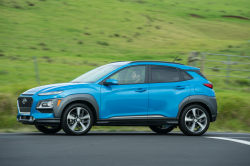
— Hyundai battery problems in Hyundai Kona EV and Hyundai Ioniq EV models have caused a class action lawsuit that alleges the automaker falsely advertised the range and safety of the electric vehicles.
The battery problems in 2019-2021 Hyundai Kona EVs and 2020 Hyundai Ioniq EVs cause drivers to lose range while facing the prospect of fires, a subject at least 15 South Korean owners know all too well. However, no Hyundai battery fires have occurred in the U.S.
The plaintiff alleges the lithium-ion batteries and management systems are defective which causes the batteries to catch fire.
In 2019, California plaintiff Sebastien Friche purchased a new 2019 Hyundai Kona EV and when he learned about a battery recall, his wife took the vehicle to a Hyundai dealership. The recall work was performed and he was told Hyundai reduced the battery range by 20% to decrease the risk of a battery fire.
The class action alleges that in June 2021, Hyundai issued a remote software download to decrease the battery range to 205 miles, another 10% drop in range capacity.
On July 20, 2021, the plaintiff's wife took the Kona EV to the dealer to fix a tire, but the service advisor checked the vehicle inspection number and told her the dealer would have to impound the vehicle until Hyundai could replace the battery. The service advisor allegedly said the vehicle could possibly be held six months or longer because of the fire risk.
"The service representative made various representations to Plaintiff’s wife while seizing the vehicle, including asserting that 'if anything happens, your insurance will not cover anything.' Hyundai also refused to provide her with a loaner automobile, though it finally helped her procure a rental." — Hyundai battery class action lawsuit
According to the Hyundai battery lawsuit, the rental is a terrible replacement because the vehicle uses gasoline which creates additional expenses the plaintiff wanted to avoid by purchasing the Kona Electric.
Additionally, two driving-age children cannot drive the rental car, and the rental vehicle does not have carpool privileges.
"Since Hyundai seized the Vehicle, Plaintiff has continued to contact Hyundai to determine when it will be released. Hyundai has not told Plaintiff when it plans to replace the battery, how it plans to replace the battery, or when it will ever release the Vehicle. Hyundai has told Plaintiff that even after it replaces the battery, the battery will be covered by a different warranty with a term that lasts only ten years." — Hyundai battery lawsuit
The plaintiff claims Hyundai now refuses to talk to him.
Hyundai battery problems caused a recall in October 2020 for 2019-2020 Hyundai Kona Electric vehicles, then 2020 Ioniq EVs were recalled in March 2021 for the same battery problems.
The Hyundai battery problem is allegedly due to the negative anode tab which can be folded in the battery cell and allow the lithium plating on the anode tab to contact the cathode, causing an electrical short-circuit. The Hyundai battery problems are so severe the battery can catch fire while the vehicle is charging, parked or while traveling on the roads.
Hyundai announced it would eventually replace the battery assemblies at a cost of about $900 million. However, battery manufacturer LG agreed to pay about 70% of the replacement costs.
As a temporary repair, an affected EV would be updated to prevent the battery from being fully charged, decreasing the travel range.
But the plaintiff says Hyundai's advertising for the Kona EVs and Ioniq EVs pushed the savings associated with the driving range for the Kona EV (258 miles) and the Ioniq EV (170 miles). This allegedly means the advertising was false and misleading to entice consumers to purchase the vehicles.
The Hyundai battery problem class action lawsuit was filed in the U.S. District Court for the Central District of California: Sebastien Friche, v. Hyundai Motor Co., et al.
The plaintiff is represented by McCune Wright Arevalo, LLP.




